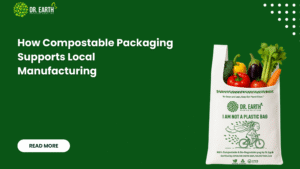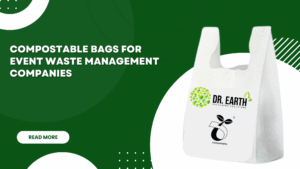
In today’s climate, it’s no longer just cool to have sustainability as a practice; the hospitality industry is at a point in time where it is heavily impacted by sustainability and waste management decisions. Hotels and resorts are places of comfort and luxury but also a major contributor to waste with all the goods and services they provide. On any given day, night, and week hotels and resorts produce waste from various sources. Guest room amenities, Kitchen waste, Packaging waste, Housekeeping waste, etc. Their waste management and choices we make can either be part of the planet’s problems or solutions.
One of the easiest ways to implement a change in hotels and resorts today is to simply switch to biodegradable bags. In this blog, we focus on biodegradable bags as a great option for hotels and resorts, what is good about them, different options to consider, how hotels and resorts can implement these products in their operations to help paint a greener picture, in time to come
Why Should Hotels and Resorts Use Biodegradable Bags?
The Environmental Impact of Hospitality Waste
Hotels and resorts produce tremendous amounts of waste each day. Waste comes in many forms: food waste from kitchens, plastic waste from guest amenities, housekeeping waste and more. Until relatively recently, much of this waste had been disposed of via non-biodegradable plastics which do not break down for hundreds of years. Plastics are detrimental to wildlife, they pollute waterways and oceans, and they contribute greatly to the ongoing global plastic pollution problem.
Making the switch to biodegradable bags is an important step for hotels and resorts to mitigate this particular crisis. Biodegradable bags break down naturally into non-harmful components when disposed of properly and they are usually far more biodegradable than single use plastics. Hotel and resort properties will now be able to reduce waste and pollution in landfills.
Aligning with Growing Consumer Expectations
Modern travelers, especially Millennials and Gen Z, are much more environmentally minded than their predecessors. They want to stay at hotels and resorts that show responsibility to the environment. Each hotel or resort provides guests with a small amount of waste in the form of amenities. Before leaving, guests will notice hotels and resorts giving them biodegradable bags that helps the environment. What better way to show that they are committed to sustainability than to give them a biodegradable bag? Because this is a physical action that guests can see, it creates trust in eco-conscious customers to be loyal clients.
Regulatory Compliance and Future-Proofing
Countries and cities around the world are enacting laws to remove single-use plastics. By giving guests biodegradable bags, hotels and resorts can not only be compliant to the laws but is also being proactive if legislation band single-use plastic in their destination.
Cost-Effectiveness Over Time
Biodegradable bags may seem initially more costly than traditional plastic bags, but they can potentially save money by lowering waste disposal fees and the risk of fines for plastic bans. In addition, the marketing and brand reputation perks of biodegradable bags are usually converted into increased customers and increased revenue.
What Are Biodegradable Bags?
Biodegradable bags are made from natural materials, like cornstarch, vegetable oils, or other plant-based polymers that can decompose naturally over time through microorganisms like bacteria and fungi. Bags decompose completely into water, carbon dioxide, and biomass, while traditional plastics can break down in years to centuries, and often into useless and dangerous microplastics.
Biodegradable vs. Compostable Bags
It’s fundamental to distinguish between biodegradable and compostable bags:
- Biodegradable bags will decompose over time but can leave materials behind, and some do not decompose in a given time.
- Compostable bags, found under specific composting conditions, typically degrade within 90 to 180 days, leaving no toxic residue.
Hotels and resorts should select certified compostable bags to use for organic waste, because certified compostable bags will safely decompose completely.
Types of Biodegradable Bags Suitable for Hotels and Resorts
Since various departments in a hotel produce different types of waste, it is important to choose the right biodegradable bag for each purpose.
1. Housekeeping Trash Bags
Non-organic and organic waste is produced by housekeeping departments from guest rooms as well as common areas. Using biodegradable trash bags in this context is a way to reduce the amount of plastic. They should also be able to handle the various types of refuse, from tissue or wrappers to light plastics; therefore, having strength and long-lasting durability is extremely important.
2. Food Waste Bags
Kitchens and food preparation areas can produce a lot of organic waste. Here, compostable biodegradable bags are appropriate since they can be thrown out with food waste at a composting facility. This decreases contributions to landfills and the risk of odor.
3. Laundry Bags
Hotels and resorts have plastic bags for collecting soiled linens and towels. Since these must be taken off-site for laundering, the only requirement is that the biodegradable laundry bags meet the required levels of hygiene and cleanliness standards.
4. Amenity Packaging
Some hotels offer complimentary toiletries in plastic bottles or packaging. While this point addresses the topic of which type of waste bag, it is becoming increasingly common for hotels to move towards biodegradable packaging options for toiletries/amenities in tandem with offering biodegradable garbage bags.
Benefits of Biodegradable Bags for Hotels and Resorts
Environmental Benefits
- Less Plastic Pollution: Biodegradable bags can disintegrate naturally, which reduces the build-up of potentially recyclable but non-biodegradable plastics.
- Less Carbon Footprint: Creating biodegradable bags uses relatively less fossil fuels than conventional plastics.
- Support Circular Economy: Biodegradable bags help close the loop in a more sustainable system, where waste can safely return to the Earth.
Operational Benefits
- Easier Waste Management: Biodegradable bags can often go directly in their natural forms into organic waste collection, which allows more fluid disposal.
- Waste Policy Compliance: Hotels receiving green certifications or awared for sustainable tourism initiatives would benefit greatly from using these environmentally friendly materials.
- Less Odor and Pests: Biodegradable bags placed properly with organic waste collections are less odorous and attract fewer pests as waste disposal.
Marketing and Brand Benefits
- Meeting Consumer Expectations: consumers are increasingly wanting eco-friendly places to stay.
- Positive Brand Image: showing environmental responsibility/commitment will set a hotel or resort apart in a very crowded marketplace.
- Opportunities for Certifications: Many eco-tourism and green building certifications require sustainable waste management.
Challenges and How to Overcome Them
Cost Concerns
Biodegradable bags may cost more than conventional plastic bags. However, hotels can:
- Purchase in bulk to help lower, if not totally decrease, the unit cost.
- Consider the total cost of ownership, or the reduction of waste disposal fees and possible regulatory violation fines.
- Use the sustainability aspect as part of your marketing, and that could increase revenue.
Quality and Durability
Biodegradable bags have to be durable enough for their intended purpose. Hotel management should:
- Use a reputable supplier that can prove they offer quality material.
- Consider requesting samples to test for durability before substantial implementation.
Staff Training
Effective use is critical to success. Hotel staff should:
- Train housekeeping and kitchen staff to use the waste bins properly and train the staff on proper waste segregation.
- Communicate the benefits of using all procedures to staff to gain their cooperation.
How Hotels and Resorts Can Implement Biodegradable Bags
Step 1: Audit Current Waste Practices
Understand the amount of waste produced and the types of waste, and where plastic bags are used.
Step 2: Choose Certified Biodegradable Bags
Make connections with reputable suppliers (e.g. Dr. Earth) who can supply certified biodegradable and compostable bags.
Step 3: Staff Training and Awareness
Train the staff and create awareness by conducting workshops and providing signs to aid the correct use of biodegradable bags.
Step 4: Partner with Waste Management Services
Partner with a local waste management service that specializes in composting or in the disposal of biodegradable waste to ensure proper disposal.
Step 5: Monitor, Review, and Communicate
Monitor the impact of the use of biodegradable bags (waste reduction and cost) and communicate sustainability accomplishments to guests through marketing and promotions.
Conclusion
The hospitality industry has a unique opportunity to create significant societal impact on a large scale. For hotels and resorts, using biodegradable bags is an important way to reduce your footprint while building brand equity as you initiate a sustainable path forward.
This is a simple action that reflects global trends, drives consumer expectations, and adheres to increasingly essential regulations. More than that, it communicates that sustainability is not at odds with luxury, adding significant value to guests staying with you who want comfort, while doing the right thing for the planet with their choices.
If you are an owner or operator of a hotel or resort and are contemplating biodegradable bags to replace traditional single-use plastic, it is important to work together with suppliers you trust as well as staff. Collectively, you will be contributing to a healthier planet and a brighter and more sustainable future in hospitality.
FAQs
1. Are biodegradable bags strong enough for hotel waste?
Yes, certified biodegradable bags are created for durability, with features that minimize breakage and leakage in handling housekeeping and kitchen waste.
2. How do biodegradable bags break down?
Biodegradable bags break down naturally through the action of microbes with the bags decomposing into harmless water, carbon dioxide and biomass.
3. Are biodegradable bags more expensive than plastic bags?
The short answer is yes, but because most businesses will buy in bulk and will spend less overall on waste disposal and compliance costs, the additional product cost is often negated.
4. Can biodegradable bags be composted at home?
Some are suitable for home composting, but many require industrial composting facilities. Check the product certification.
5. How can hotels ensure proper disposal of biodegradable bags?
Partner with local composting or waste management services experienced in handling biodegradable waste and train staff on segregation.
Share:
Related Posts














